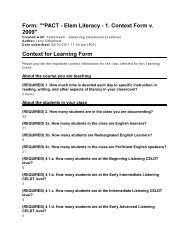The Tutoring Book - California State University, Sacramento
The Tutoring Book - California State University, Sacramento
The Tutoring Book - California State University, Sacramento
Create successful ePaper yourself
Turn your PDF publications into a flip-book with our unique Google optimized e-Paper software.
Through the Looking Glass: the <strong>Tutoring</strong> Experience through the Tutee’s Eyes<br />
14<br />
Andrea M. Hubbard<br />
Setareh Tabrizi<br />
Spring 2011<br />
On the first day of class, we were asked to share what we feared the most about tutoring writing.<br />
My greatest concern was knowledge. Did I have a solid knowledge foundation that would enable me to<br />
support my fellow students? This fear was allayed my first day of tutoring for it was clear I knew enough<br />
about writing and problem solving to assist my tutees. As I met with each student and I fought against<br />
my fear of ineptitude, it became clear they too were dealing with fear. In some cases, this fear was<br />
debilitating for students. It prevented many students from fully participating in reviewing their work. As<br />
I tuned in to the nervousness of the students, I felt I understood where it was coming from, but I wanted to<br />
experience what it felt like to sign up for a tutor and have your paper reviewed by a peer. What fears and<br />
prejudices did I bring to the writing table? What prevents a student from settling in and becoming<br />
comfortable with a tutor and what prevents them from coming back? <strong>The</strong> purpose of my experiment was<br />
threefold: 1) to locate ways in which the writing center tutors could gain improved retention of student<br />
writers, 2) to implement practices which would make my own writers feel more comfortable in the<br />
Writing Center, and 3) to become a better writer myself.<br />
I walked nervously to the front desk. I felt silly for wanting to know what my writers were<br />
experiencing. I felt silly, like I was crossing an invisible line. I chose a tutor and time slot and hoped for<br />
the best. I imagined this experience was similar for students. As I waited for my appointment, I began to<br />
grow increasingly nervous. I looked at the papers I had to work on and mentally listed their weaknesses.<br />
Was I really going to let a stranger, in a close, intimate environment read my papers? What if he thought<br />
I was the worst writer on the planet? What if he thought I was an idiot in general? My insecurities<br />
gradually built until the time of my appointment. My tutor laughed when he saw me. As I explained<br />
what I was attempting to do, he smiled and agreed to be my tutor. I discovered from this first interaction<br />
how important a smile is in alleviating the nervousness of the student. However, as we began to work, I<br />
found that I was uncomfortable as he reviewed my work silently. I experienced difficulty expressing my<br />
thoughts when he questioned the goals of my essays. I felt flushed and embarrassed and absolutely<br />
wanted to turn all control over to him and defer to his judgment regarding my papers. From this initial<br />
meeting, I understood fully what my tutees were experiencing and why they had trouble explaining their<br />
goals and why they felt the need to push their papers towards me. It seemed like a natural thing to do in<br />
the setting. Already, we were arriving to the session with preconceived notions of hierarchy. I assumed<br />
he had knowledge I did not have.<br />
<strong>The</strong> next session, I got over my stutter, but not the feeling of being a bad writer. It seems when I<br />
entered the writing center as a tutee, I feared the tutor would judge that I needed help because I was a<br />
terrible writer. Since writing is a creative endeavor, the student may feel personally threatened or over<br />
critical of their work. Consider a time when a tutee of yours said something deprecating about their work.<br />
I can recall several instances where I reassured writers that they had the necessary ability to write<br />
proficiently. It was not until my third session that I felt comfortable with my tutor. He exhibited no hint<br />
of admonition for poor writing. I began to trust his judgment and recognize that his suggestions were<br />
sound. I began to want to own my work and looked eagerly over it with him. From this experience, as it<br />
applies only to regularly scheduled students, I discovered that it takes time for the student to warm up to<br />
their tutor. As it applies to tutee retention, this experience shows that the discomfort surrounding the first<br />
and second meetings may negatively affect the student’s decision to return to the Writing Center.<br />
What I enjoyed most about being a tutee was brainstorming ideas for papers. It is my favorite<br />
part of tutoring. <strong>The</strong> collaborative atmosphere allowed me to see my tutor as an equal. He made no<br />
attempt to hijack my ideas and force his own upon me. I realized, through collaboration, that I had been<br />
silly to be afraid in the first place. <strong>The</strong>re was no harm here in the writing center. <strong>The</strong>y were just students<br />
like me who wanted to become better writers. This was a place to practice writing not bash it. My tutor

















